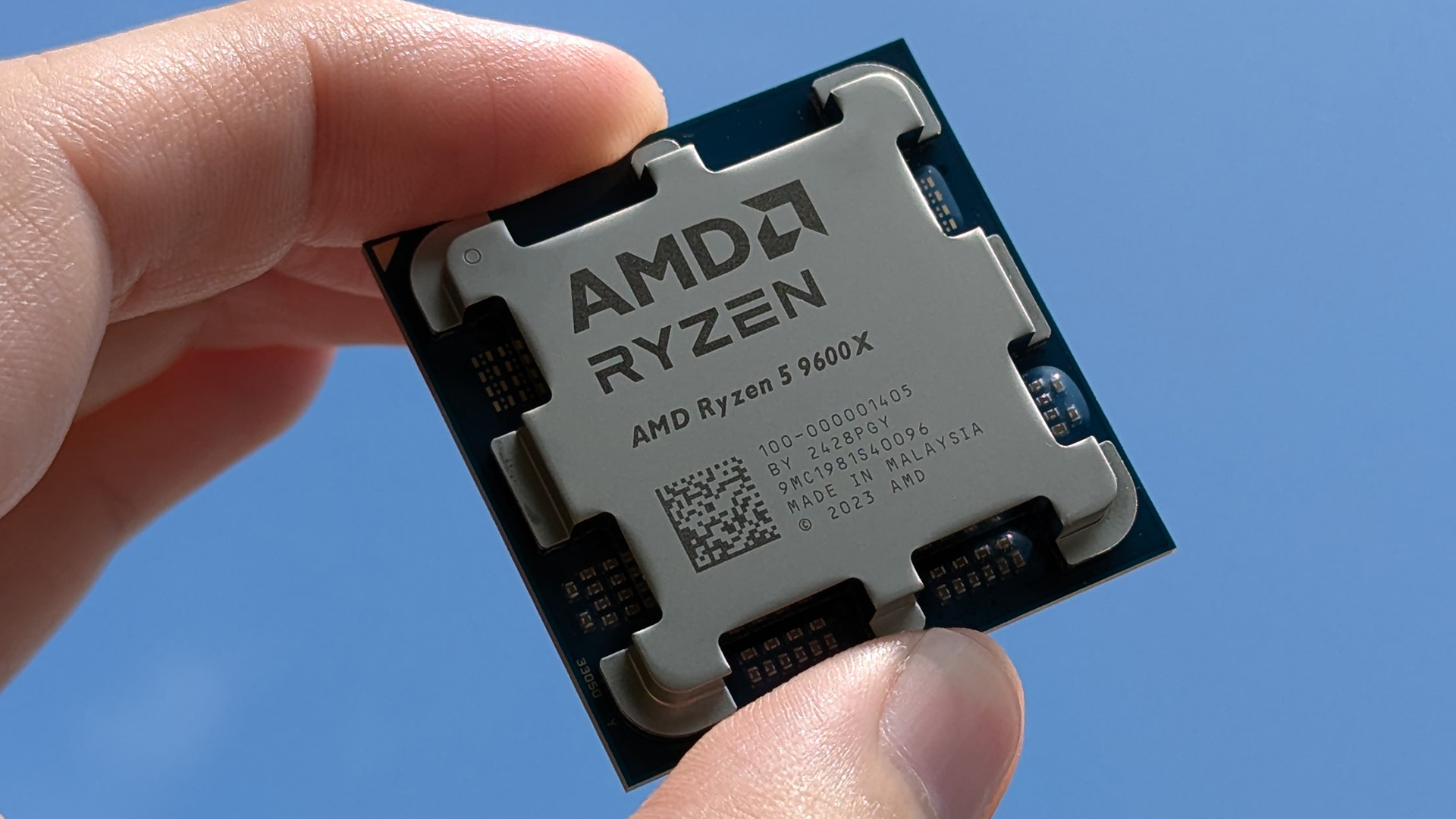
AMD's Ryzen 5 5600X was one of my all-time favorite processors, thanks to an astronomically perfect balance of performance and price, even if I did spring a little extra cash for the 5800X in my desktop.
Nevertheless, any successor has a mountain to climb to receive the same praise as its 5000 Series precursor. Ryzen chips have always been a go-to pick for custom builders on a budget, and the -X range targets enthusiast gamers, with the AMD Ryzen 5 9600X opening as the entry-level chip in the new Ryzen 9000 Series.
Can it stand as the new hot pick for budding PC gamers looking to enter the modern age of AM5 motherboards with everything AMD's Zen 5 architecture can offer, or is it outshined by its slightly beefier Ryzen 7 9700X sibling and even AMD's previous-gen chips? Here's what I found in my testing.
Ryzen 5 9600X: Price, availability, and specs
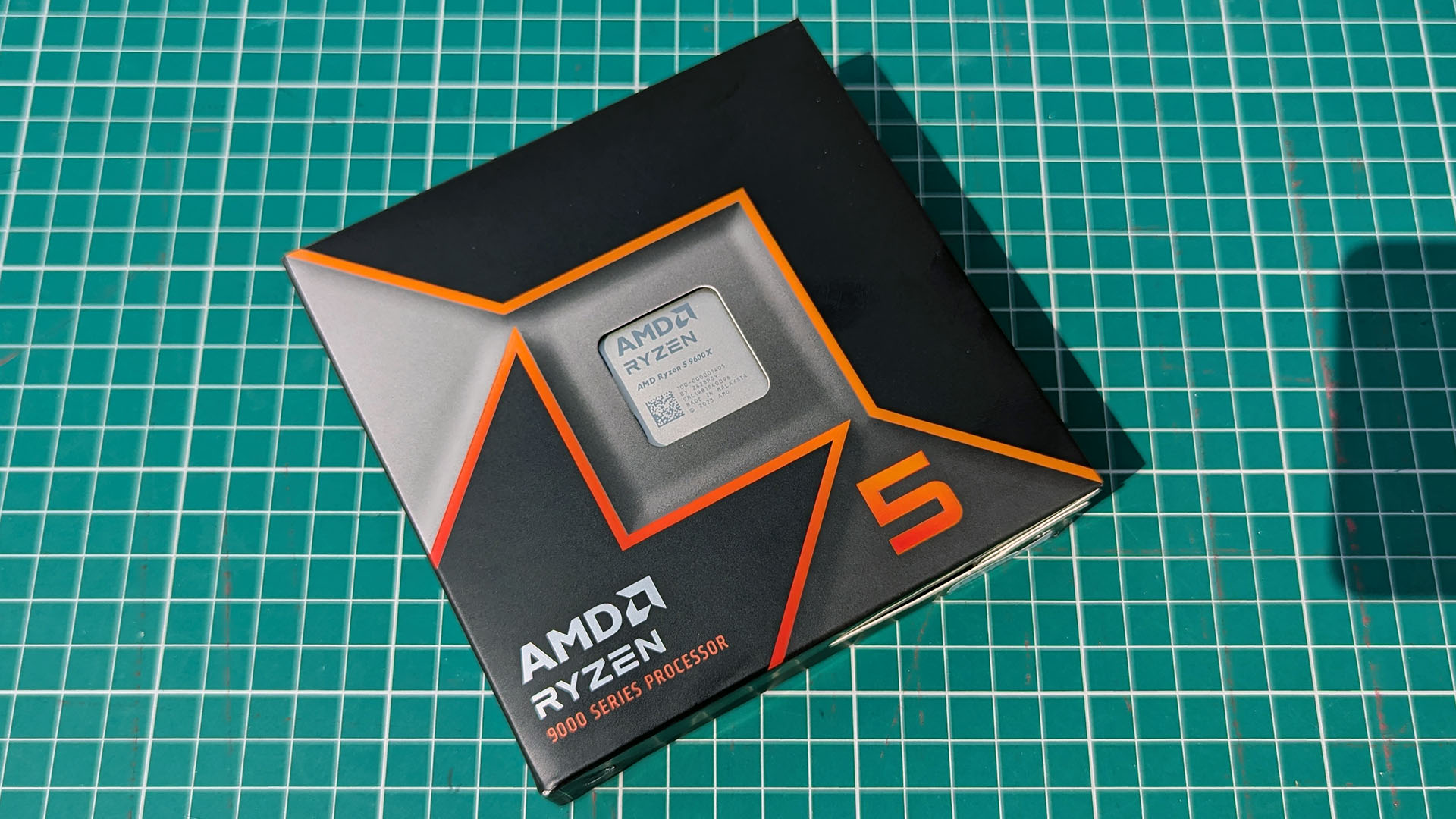
Price: $279 at Newegg
Release: August 8, 2024
Cores/threads: 6c 12t
Base clock: 3.9GHz
Max boost: 5.4GHz
L3 cache: 32MB
TDP: 65W
AMD will offer the Ryzen 5 9600X through major third-party storefronts, like Newegg and Best Buy, for a $279 MSRP from Thursday, August 8, 2024 — $20 cheaper than the previous-gen Ryzen 5 7600X and the 5600X before it.
The entry-level 9600X also sees AMD returning to a 65W base TDP, just like the Ryzen 5 5600X, after which it temporarily climbed to 105W for the 7600X. The base clock is 3.9GHz, higher than its mid-range sibling, the Ryzen 7 9700X, while the max turbo clock raises slightly this generation to 5.4GHz.
Core/thread count and L3 cache count remain the same at 6c/12t, meaning AMD has another chance to showcase performance-per-watt improvements with its 4nm manufacturing process and Zen 5 architecture within the new Ryzen 9000 Series.
AMD doesn't include a dedicated NPU (Neural Processing Unit) for local AI processing on the Ryzen 9000 chips but has improved LLM performance overall with an 'enhanced' Advanced Vector Extensions 512 (AVX-512) datapath. Otherwise, AMD's recently launched Ryzen AI 300 Series mobile chips focus on generative AI in laptops, like the ASUS Zenbook S 16 (UM5606) that "challenges Snapdragon X and stomps Intel Meteor Lake."
For those looking into AI-specific workloads or entry-level builds, AMD's Ryzen 8000G Series will be more appropriate, including the previously reviewed Ryzen 7 8700G, which features stronger integrated graphics than the dual-core Radeon chiplet included in the Ryzen 5 9600X, clocked at 2.2GHz. Whichever way you go, DDR5 RAM remains mandatory with AM5 sockets, but the Ryzen 9000 Series supports PCIe 5.0 expansion slots.
Recommended hardware
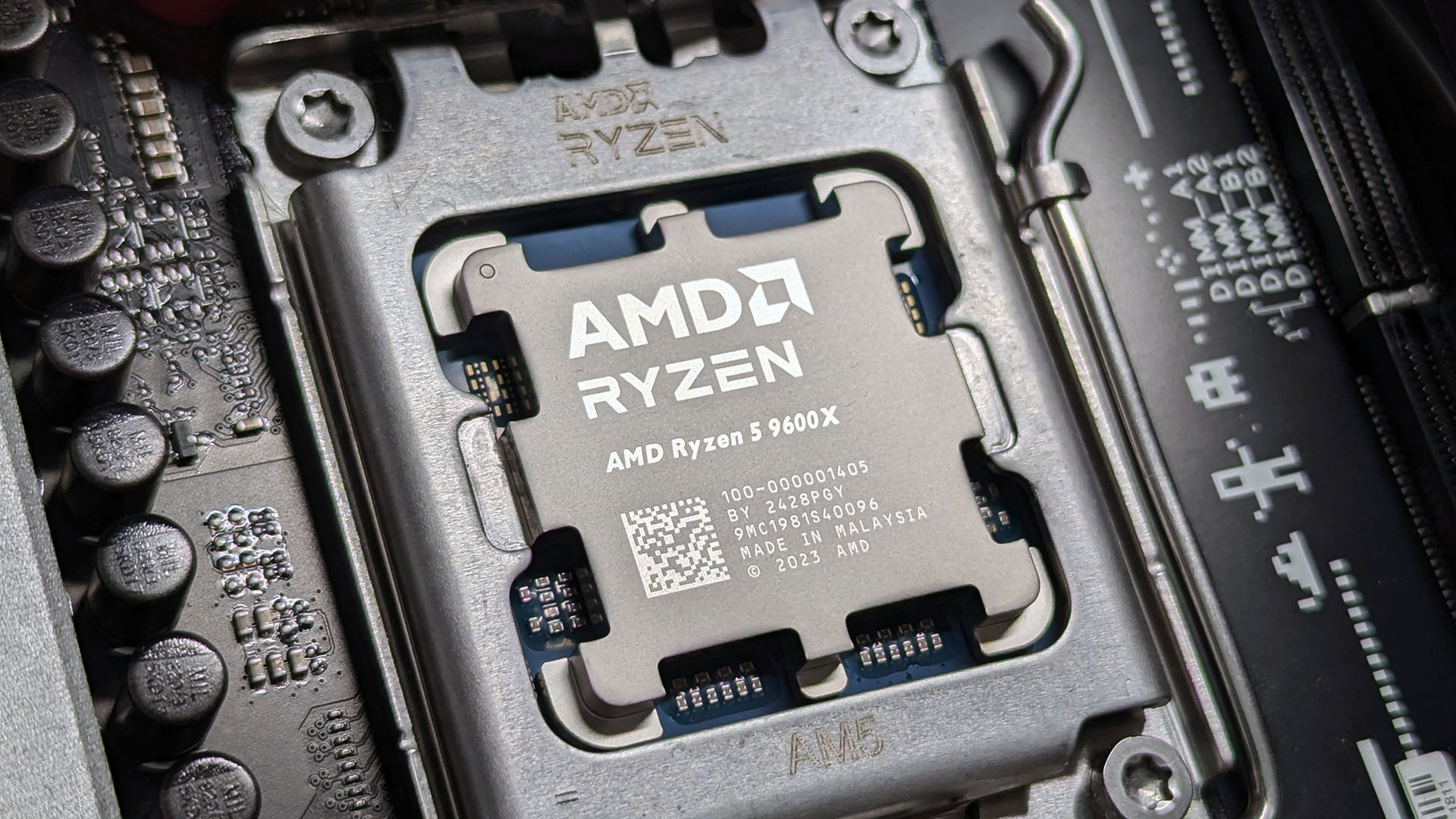
AMD recommends a tower air cooler for the Ryzen 5 9600X and the upcoming 800 Series of AM5 socket motherboards, including X870 and X870E chipsets. While the former supports overclocked DDR5 memory with speeds up to 8000MT/s and above, AMD had previously provided a sample of G.SKILL Trident Z5 Neo RGB DDR5-6400 RAM and still encouraged an AUTO:1:1 DDR5-6000 EXPO profile to stay in the Ryzen performance "sweet spot."
Ryzen 5 9600X: Multi core performance
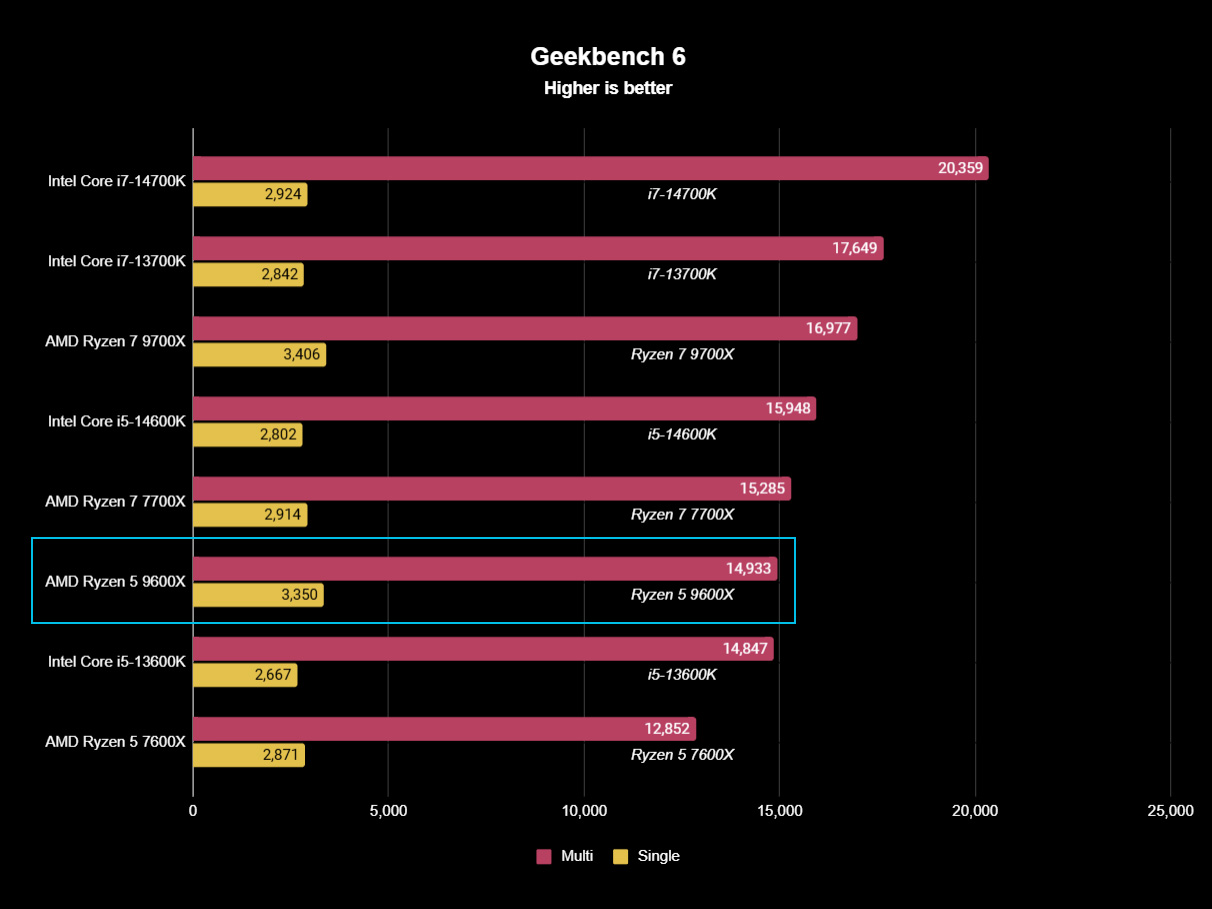
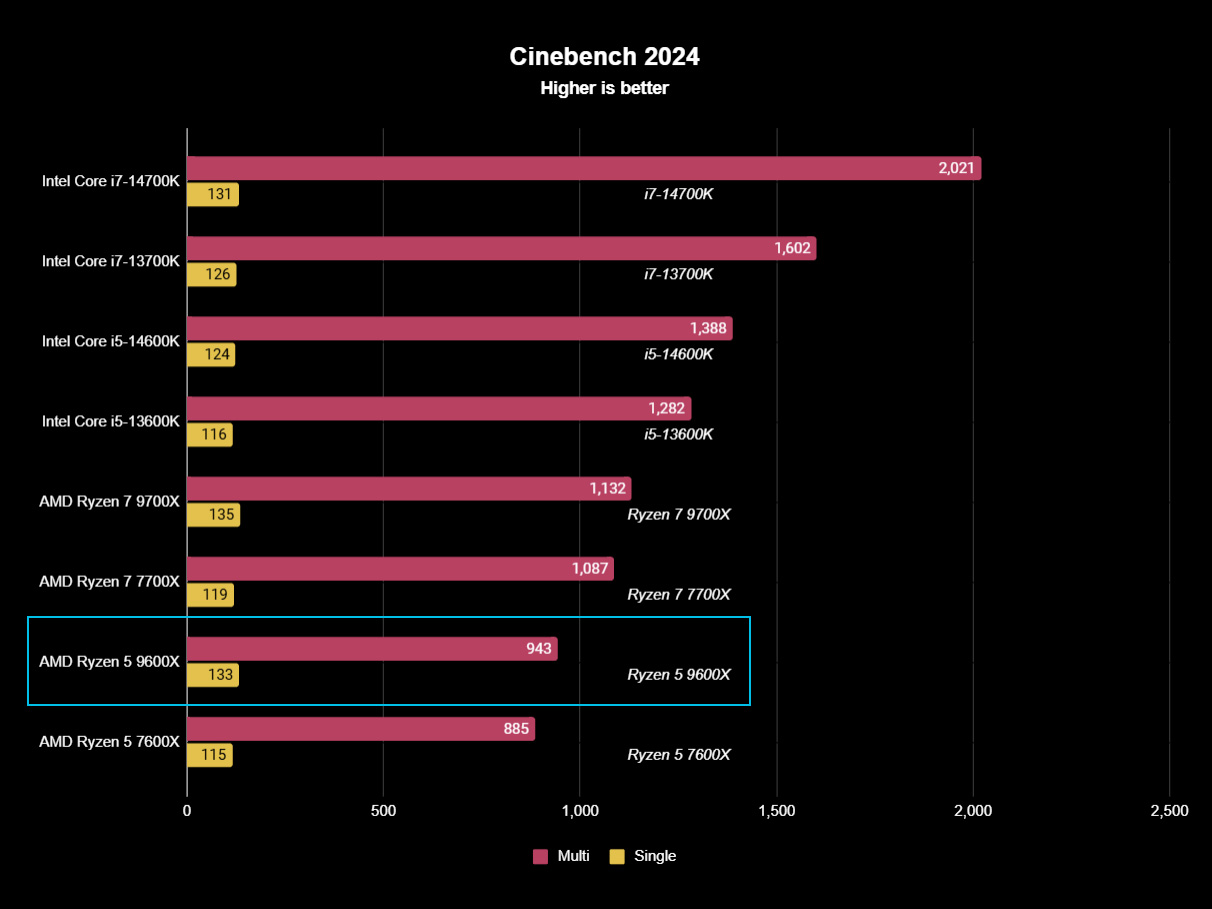
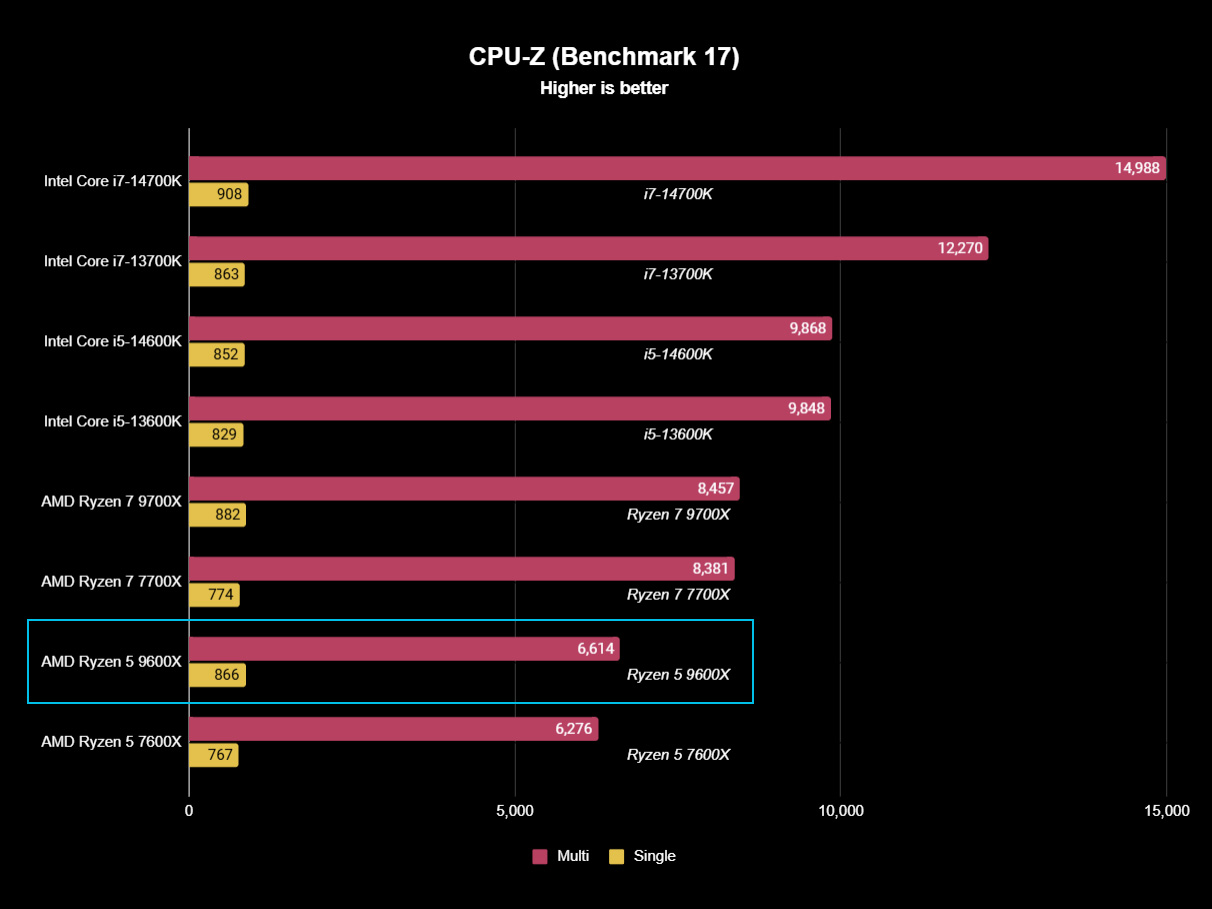
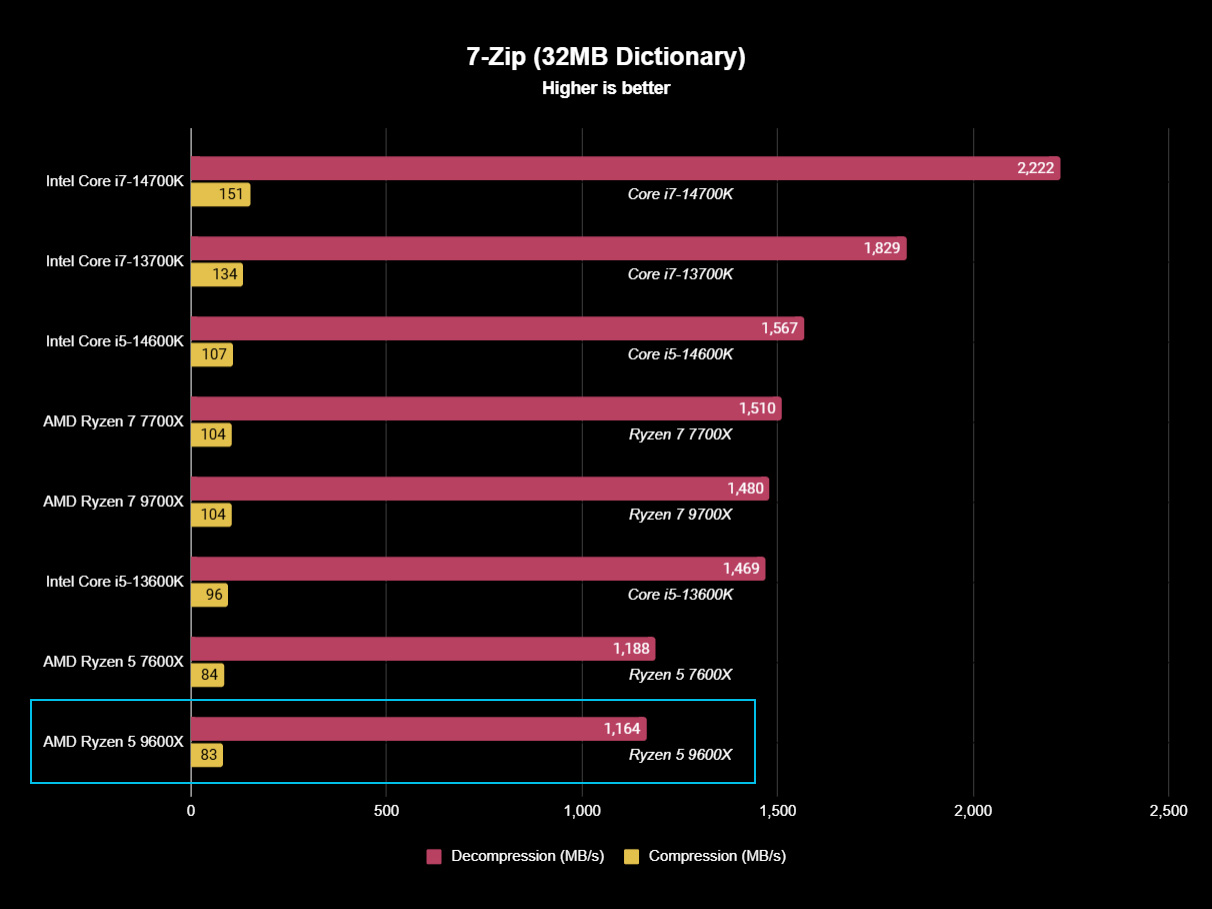
Much like the mid-range Ryzen 7 9700X, benchmarking the Ryzen 5 9600X delivers contrasting results, depending on whether you focus on multi-core or single-core performance. For burst processing tests in Geekbench 6, the 9600X pulls slightly ahead of a previous-generation Intel rival, the 13th Gen Core i5-13600K, and creeps reasonably close to the modern 14th Gen Core i5-14600K. Again, this is a 65W 8-core, 16-thread chip edging past a 125W 14c/20t Intel offering, which speaks volumes to AMD's leaps in power efficiency with Zen 5.
Generational multi-core improvements are minimal, as the 105W 7600X still beats the 65W 9600X in specific tests.
However, in sustained stress tests, the Ryzen 5 9600X falls further away from Intel and below AMD's last-gen chip, the Ryzen 7 7700X. It's not too unusual, given the higher 105W TDP on the Zen 4 7700X, but you can grab a 7700X for as low as $288 at Amazon, so it's tough to argue in favor of the 9600X with results like this. Generational multi-core improvements also range from slim numbers to negatives, with 7-Zip's simulated compression benchmark performing better on the 7000 Series chip.
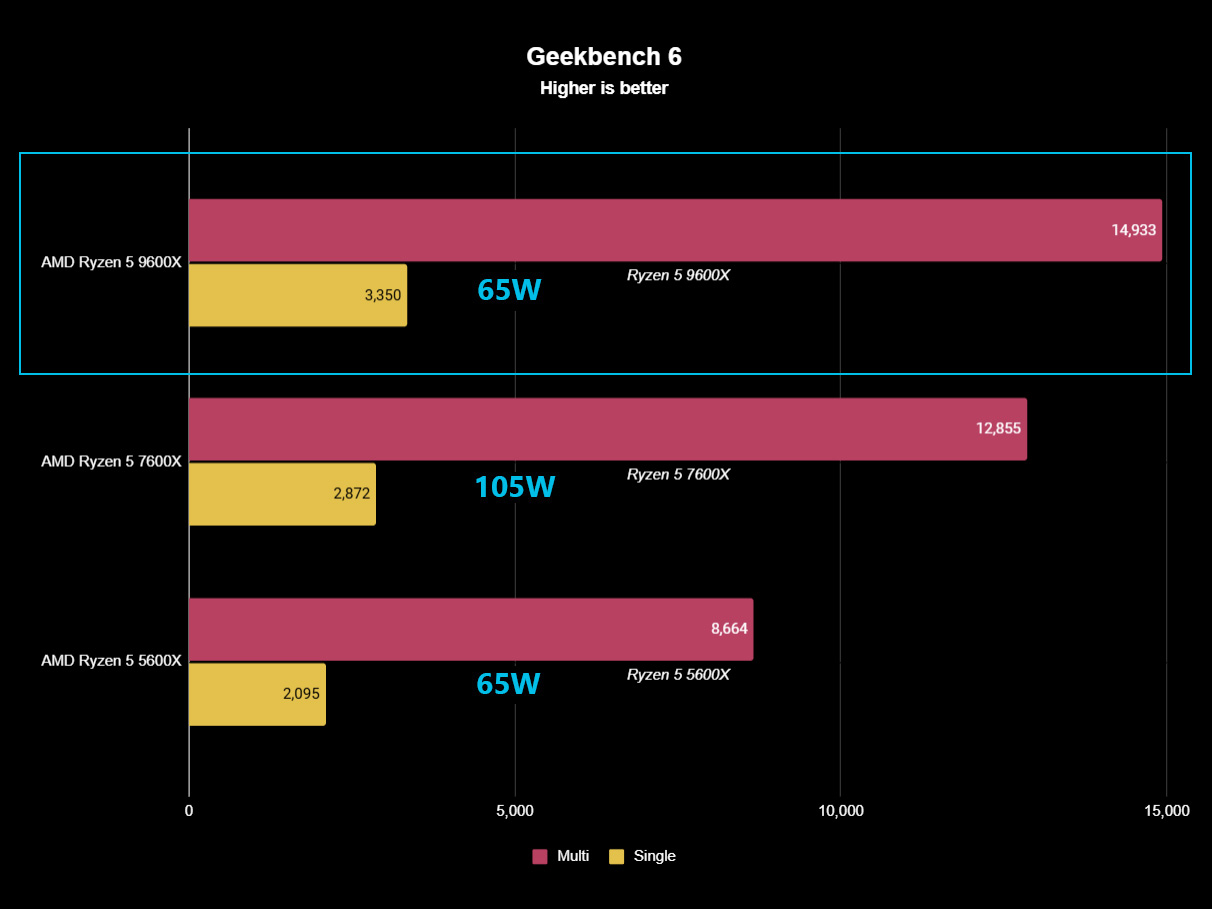
Still, it's mostly good news for Zen 5, as the 9600X exhibits improvements in multi-core burst performance over the previous-gen 7600X, albeit much less than the jump from the Ryzen 5 5600X to the 7600X. The focus is entirely on power efficiency for the Ryzen 9000 Series chips, and the 65W 9600X is primarily a decent successor to the Ryzen 7000 Series entry-level offering, the power-hungry 105W Ryzen 5 7600X.
With results like these, it's clear to those who have already adopted AMD's Ryzen 7000 Series processors that the Ryzen 5 9600X isn't worth the hassle of an upgrade. However, if you're still rocking a Ryzen 5 3600X, 5600X, or an equivalent Intel 11th or 12th Gen Core i5, then you'd be overhauling your system with an AM5 socket motherboard anyway, and the affordable Ryzen 5 9600X makes more sense.
Is the AMD Ryzen 5 9600X good for gaming?
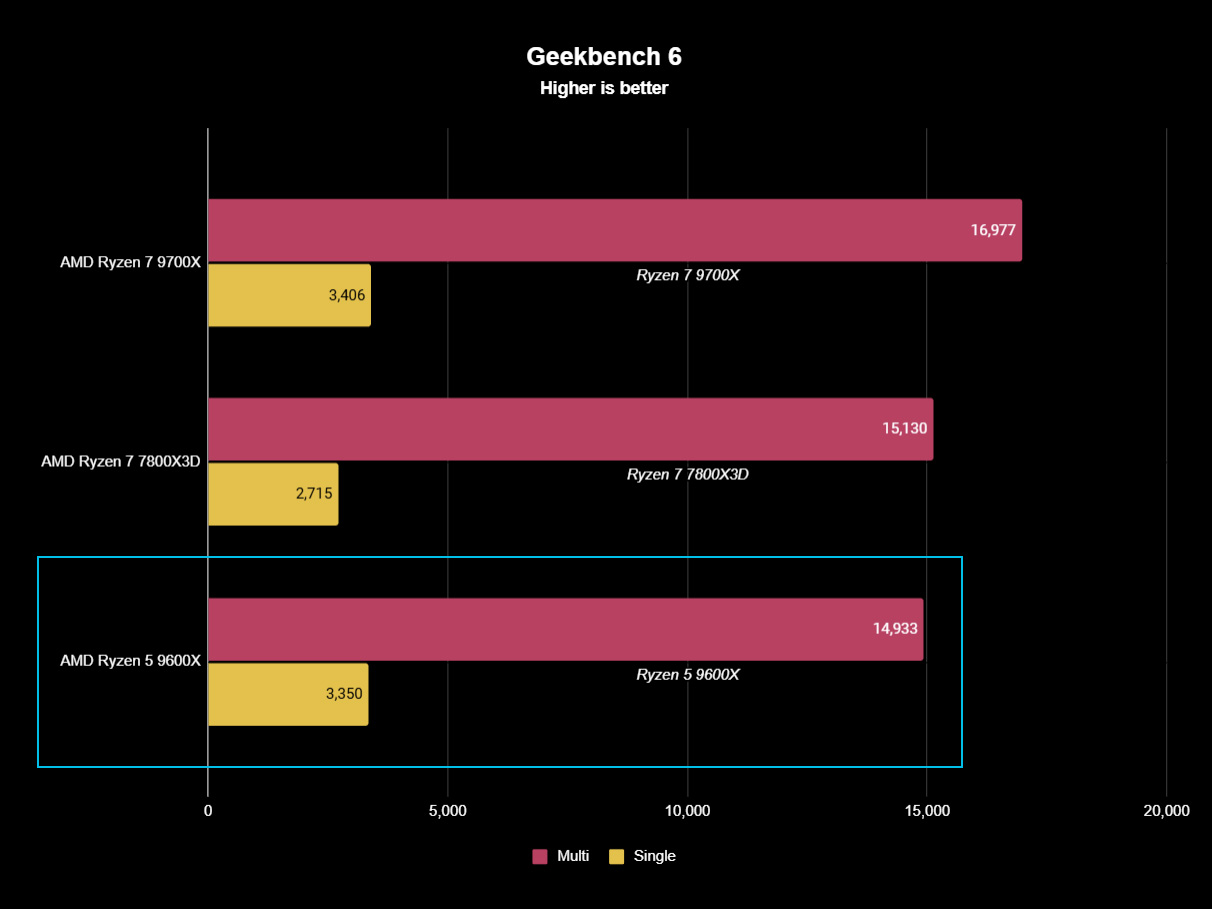
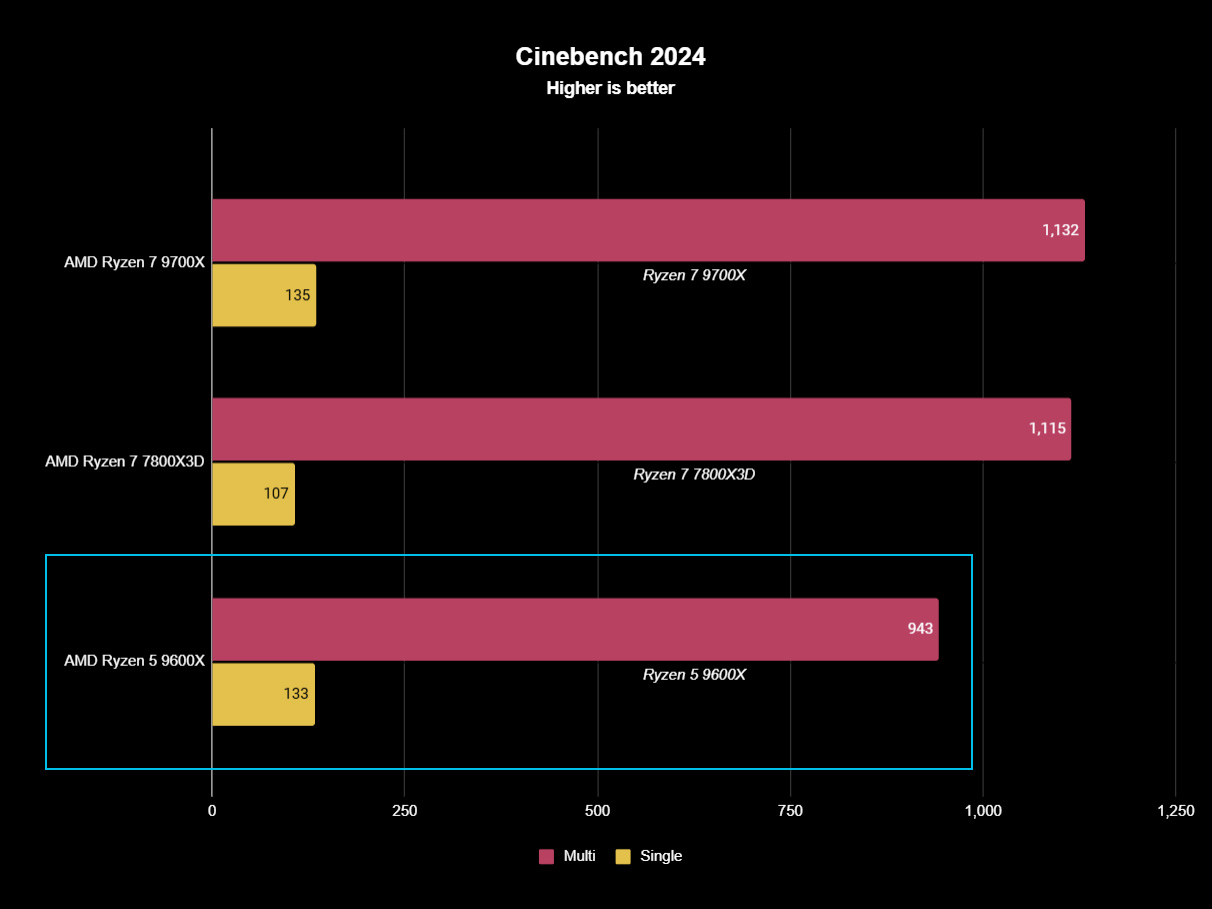
Yes, if you're on a strict budget. It even scores hot on the heels of my previous top gaming CPU recommendation: the Ryzen 7 7800X3D. While it doesn't sport the same gamer-centric 3D V-Cache as AMD's -X3D Series chips, and I expect a Ryzen 9000X3D Series will be released later this year, there's no denying that the entry-level 9600X is capable enough to handle modern PC gaming. If you want to build an affordable but modern gaming rig, the Ryzen 5 9600X is a cheaper entry-level CPU with excellent power efficiency.
Ryzen 5 9600X: Single core performance
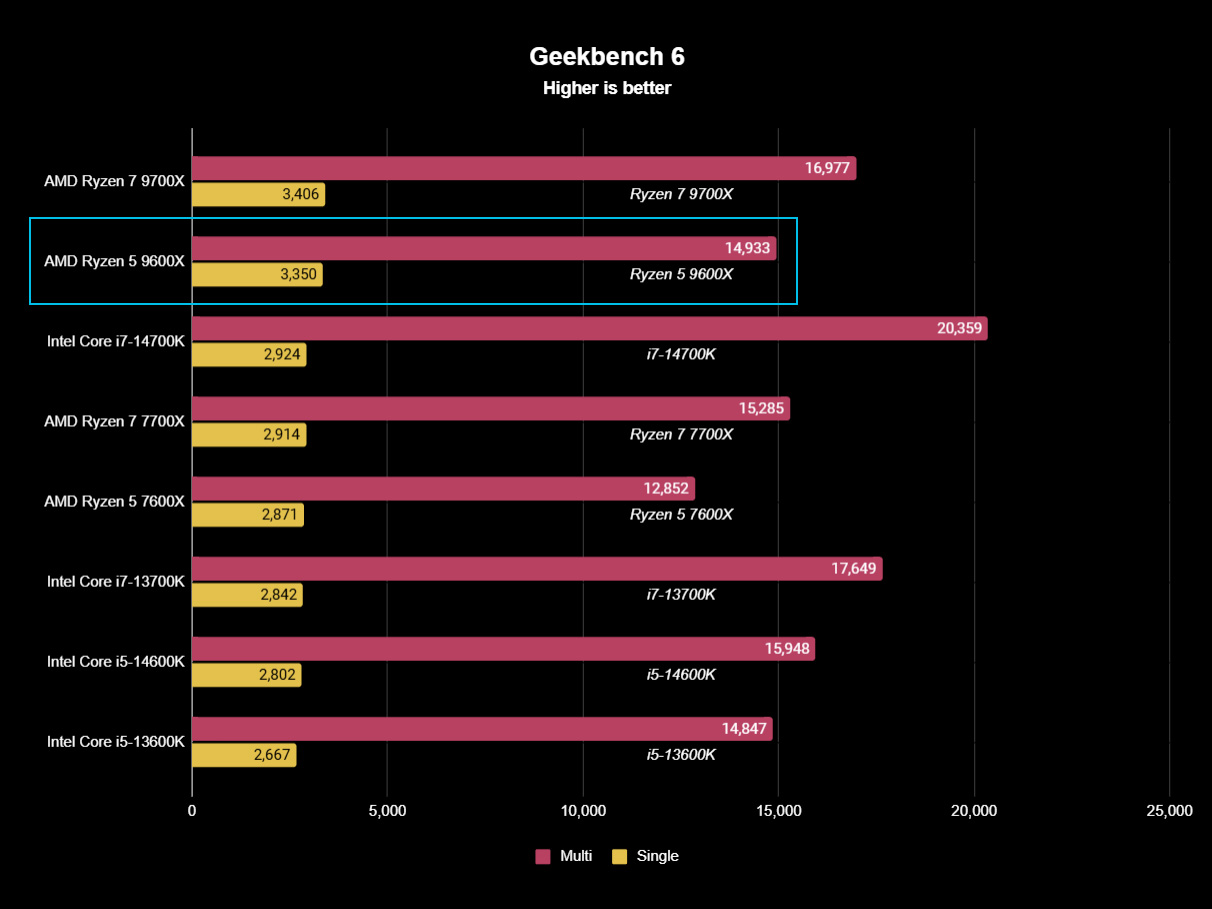
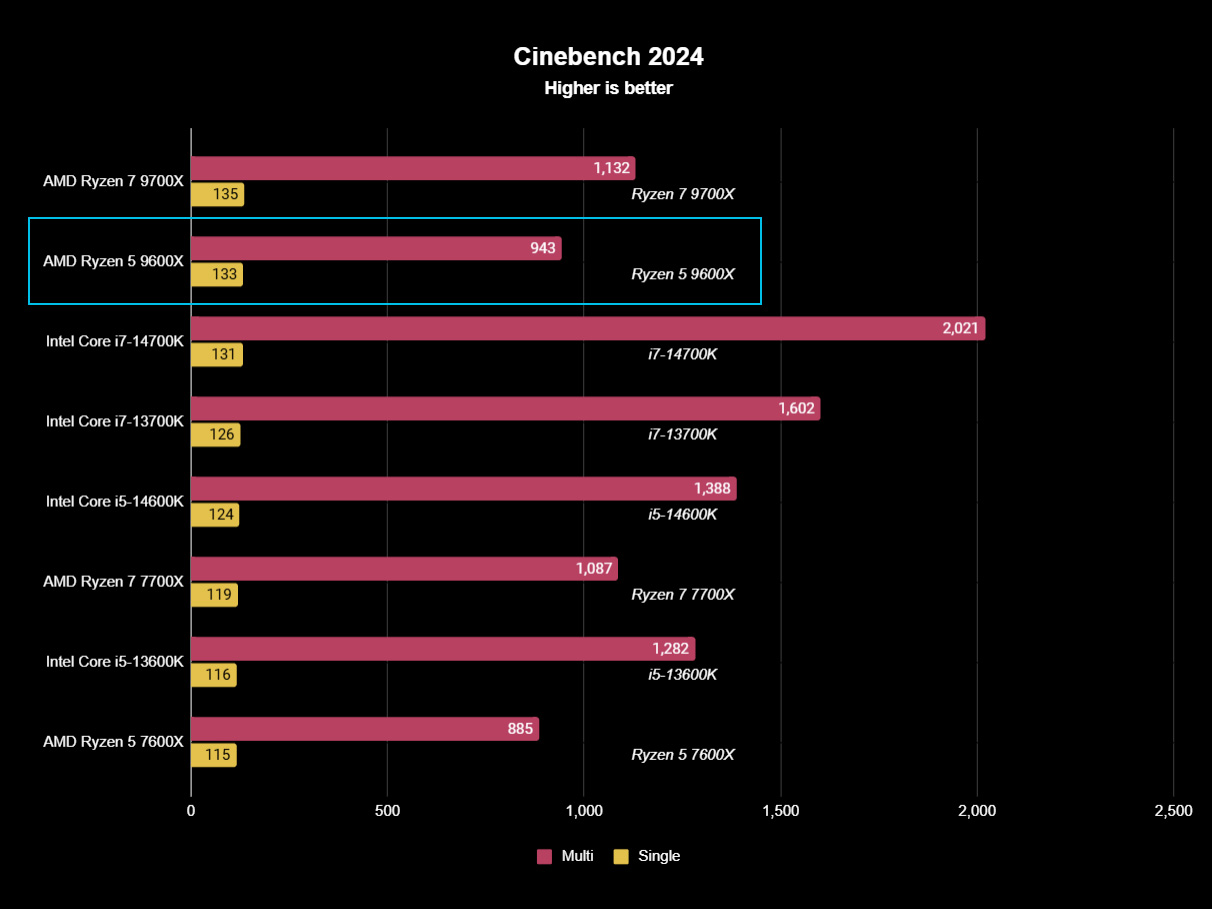
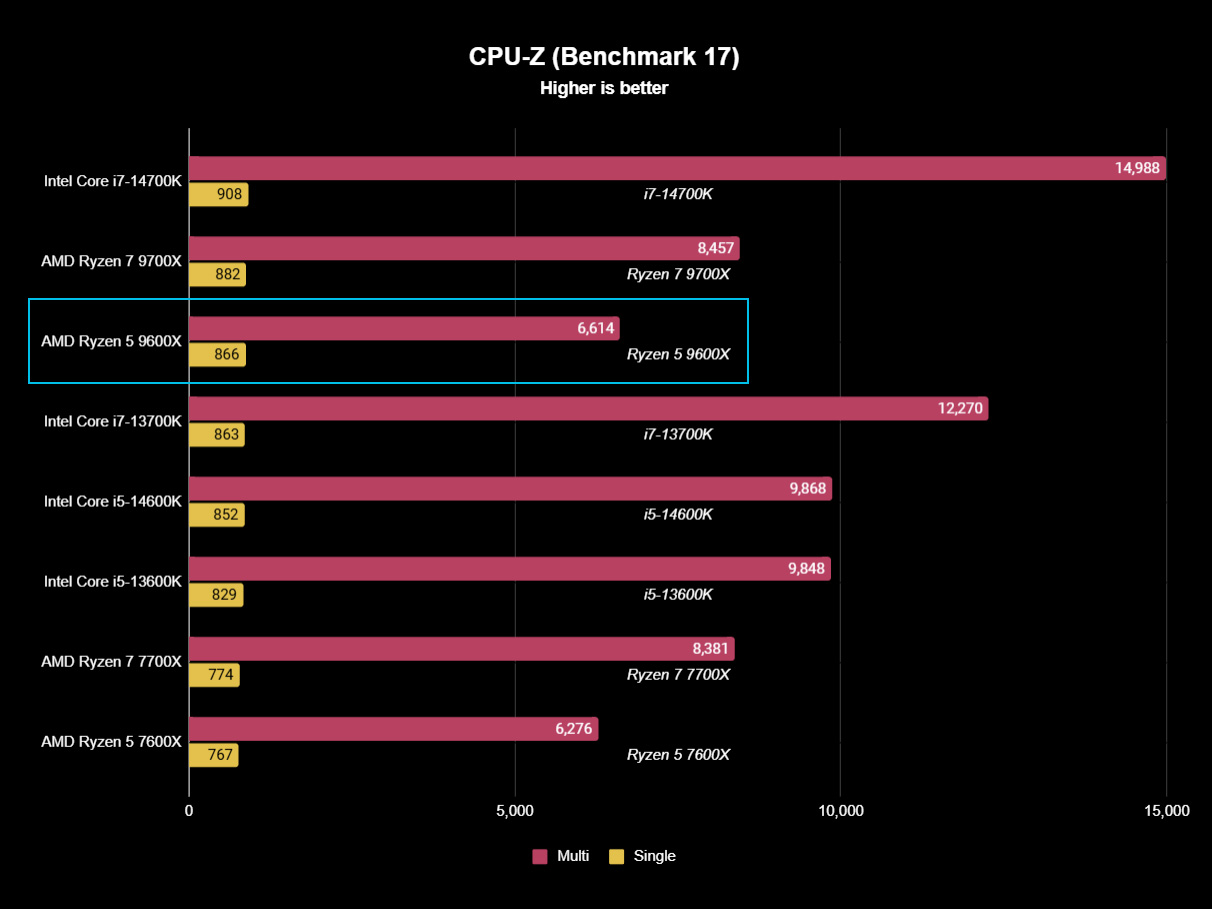
AMD comes out on top with single-core testing, with the Ryzen 5 9600X and Ryzen 7 9700X scoring among the highest benchmark results I've ever seen for 65W chips. In every test, the 9600X beats its intended rival, Intel's 14th Gen Core i5-14600K, bested only by the Core i7-14700K in CPU-Z's benchmark. Again, these Ryzen 9000 Series processors are going up against 125W Core i5 and i7 chips with much higher physical core counts, theoretically dividing a higher even wattage to a per-core amount than Intel.
AMD's 65W Ryzen 9600X beats Intel's 125W Core i5-14600K single-core performance in every benchmark.
The real-world benefits of single-core performance are tricky to quantify for the average PC user, but many modern game engines still thrive on single-thread processing. Since the 9600X is so close to the 7800X3D in multi-core performance and actually better in single-core tests, it becomes a tempting new option as an entry-level Zen 5 gaming CPU. While I start to sound like a broken record, this is another testament to AMD's triumphs in higher performance at a much lower wattage than the competition and sets a new standard for single-core scores.
Ryzen 5 9600X: The competition
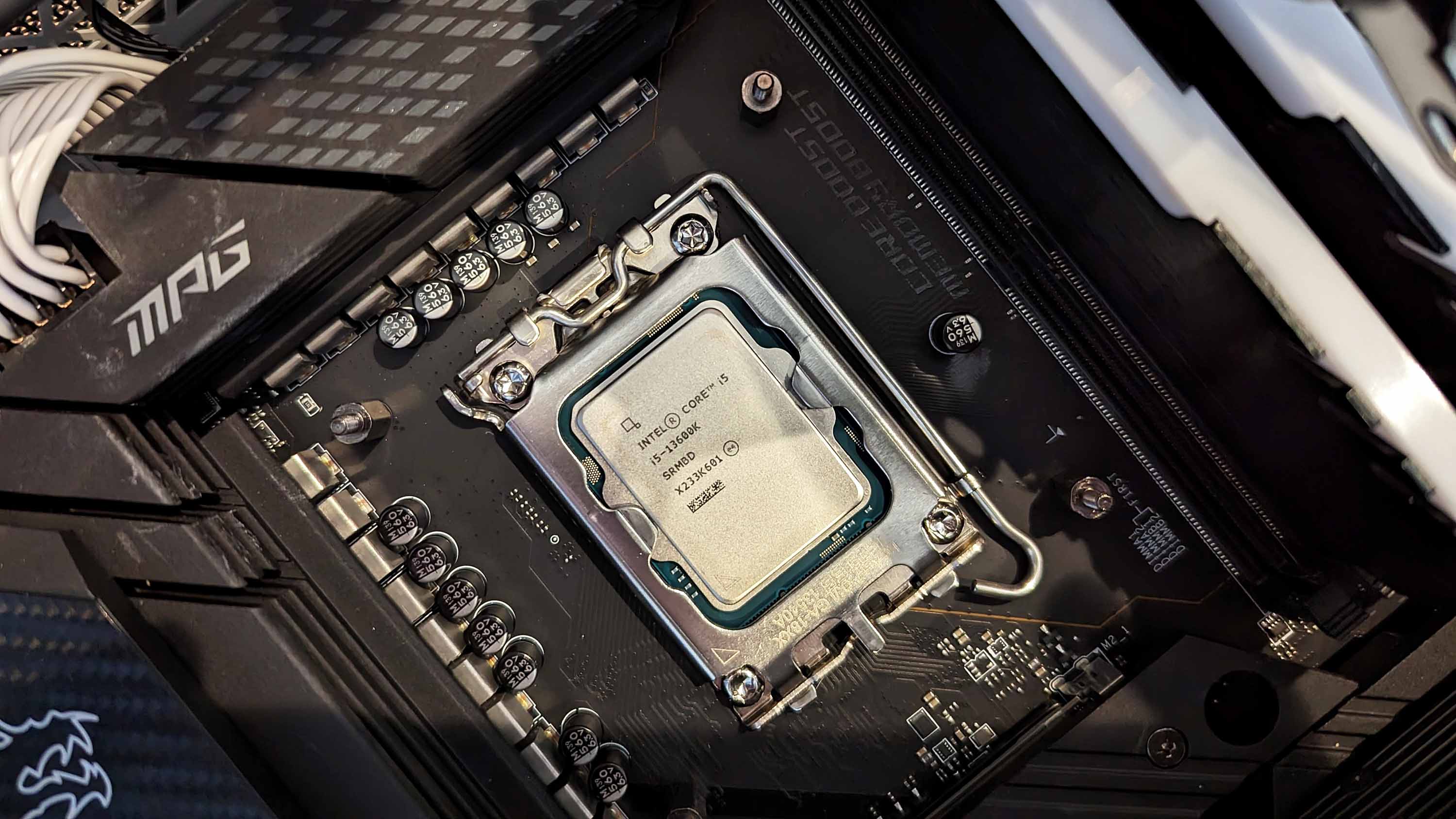
It's practically impossible to ignore Intel's instability crisis with its 13th and 14th Gen Core desktop chips, triggered by a microcode (firmware) bug that is permanently degrading affected processors. While the 13th Gen Core i5-13600K sells for around $234, it's currently impossible for me to recommend to anyone who isn't extremely comfortable with applying manual BIOS tweaks and firmware updates to prevent issues.
If you're unlucky enough to buy a 13th Gen Intel Core variant manufactured in early 2023, you might experience degradation caused by an oxidization problem discovered around this time. Intel is at least offering extended warranties and RMA assistance to those affected, but it hardly seems worth the risk to the majority of (presumably novice) PC builders looking at entry-level chips.
It's currently impossible for me to recommend Intel's 13th (or 14th) Gen to anyone who isn't extremely comfortable with manual BIOS tweaks and firmware updates to prevent issues.
Instead, the call for competitors comes from inside AMD's house. If you're a creator looking to maximize multi-core performance on an AM5 system, the Ryzen 7 7700X is only $288 at the time of writing, barely a few dollars more than the 9600X's MSRP. Otherwise, gaming enthusiasts might want to wait for the inevitable -X3D variants of AMD's Ryzen 9000 Series to take advantage of an updated version of 3D V-Cache.
Overall, if you're currently running an AMD 7000 Series chip or an Intel 13th Gen equivalent, then the Ryzen 5 9600X either won't provide enough of a performance bump or will be a negative trade-off. However, if you're still on Ryzen 3000 to 5000 or Intel 12th Gen and earlier, the 9600X is a great entry point to AMD's Zen 5 platform since you'll need an all-new AM5 socket motherboard anyway.
Ryzen 5 9600X: Should you buy?
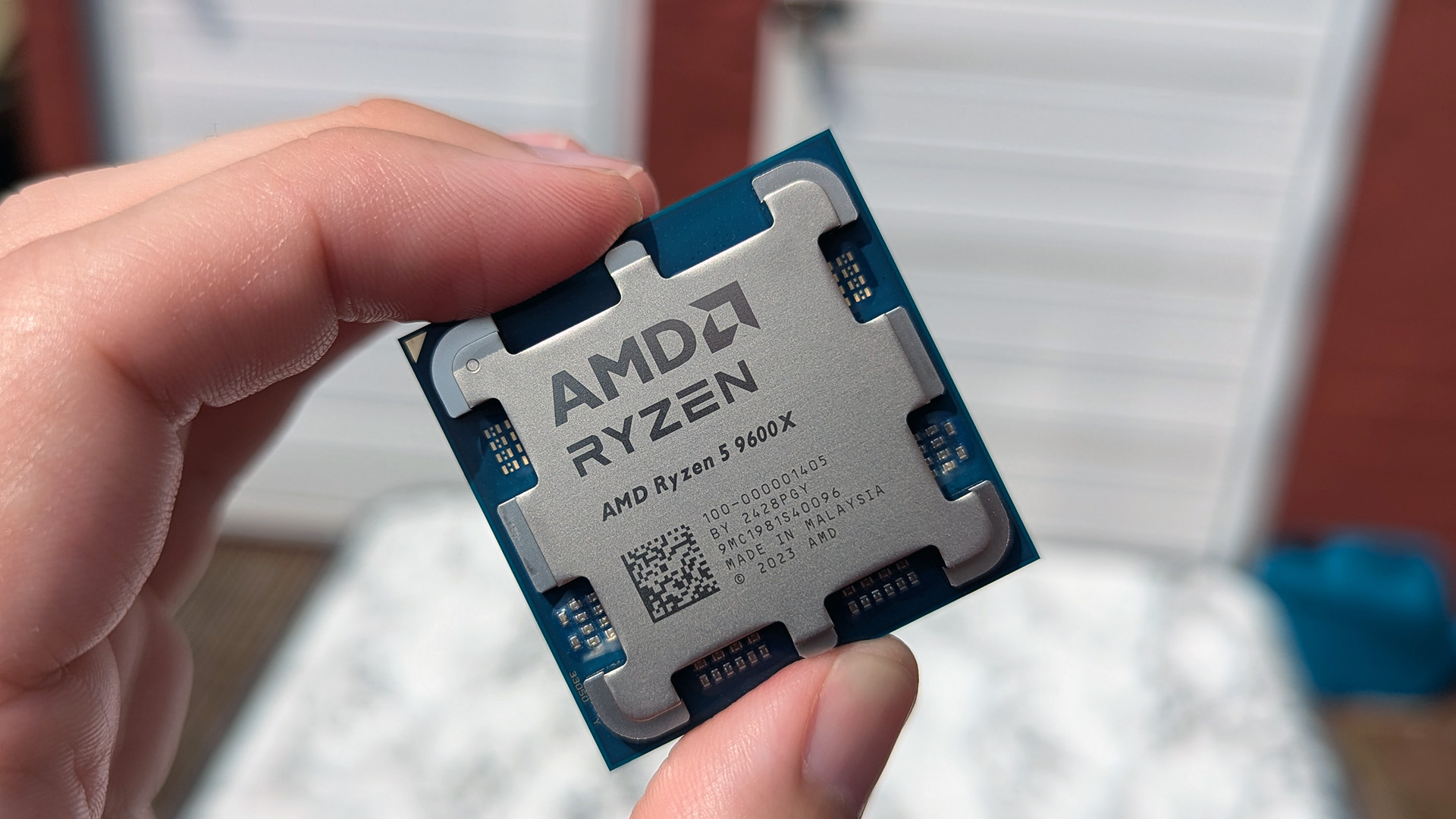
You should buy this if ...
✅ You're upgrading from much older hardware
The generational multi-core performance leaps are so minor if you're already running a Ryzen 7000 Series chip. Still, those on older processors with AM4 sockets will appreciate this affordable and versatile entry-level AM5 option.
✅ You'll benefit from single-core performance gains
AMD offers incredible single-core instructions-per-cycle (IPC) improvements for those reliant on software and games that better utilize single cores or generally lack multi-core optimizations.
You should avoid this if ...
❌ You're an all-out hardcore PC gamer
While it's tempting and more affordable than the previous-gen Ryzen 7 7800X3D, a 9000X3D variant will undoubtedly be released later this year, which will better suit high-end gaming (if you can afford the extra cost.)
❌ You're already on the AM5 socket
It's unlikely that you'll see any significant performance benefits from the 9600X if you're already running a Ryzen 7000 Series (or even 8000G Series) processor — this is mostly a minor entry-level bump, not a major step-up.
The entry-level chip of any processor generation is never expected to blow the previous range out of the water. However, AMD still delivers incredible single-core performance with the Ryzen 5 9600X. It pulls ahead of, or at least matches, every comparable Intel Core i5 and Core i7 processor and does it all with a lower TDP and more affordable MSRP. Still, it's not going to tempt those who already adopted the Ryzen 7000 Series or Intel's 12th, 13th, or 14th Gen Core desktop chips.
Instead, the 9600X stands as the perfect entry point into AM5 socket motherboards and AMD's Zen 5 architecture, with prospects to upgrade to either a top-end Ryzen 9 9950X for creators or wait for the inevitable 9000X3D gaming chips. If you're running older AM4 or LGA1200 hardware, the 9600X offers some of the best performance-per-watt value on a budget, especially if your favorite software suite and games are better optimized for single-core processing.







